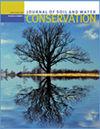Water quality improvements in Grand Lake St. Marys watershed with the region’s first saturated buffer
IF 2.6
4区 农林科学
Q2 ECOLOGY
引用次数: 0
Abstract
Saturated buffers are an edge-of-field best management practice designed to reduce nutrient loading into streams. Acting as an extension to drainage water management, these systems use a multichamber control box to raise the water table in the field (i.e., controlled drainage) and then route a portion of the subsurface drainage that does leave the field along the riparian zone using distribution tiles (i.e., saturated buffer), providing an opportunity for biological and chemical processes to reduce nitrogen (N) and phosphorus (P). Saturated buffers are inexpensive and suitable on a wide spatial scale, yet monitoring studies are lacking for many areas of the United States. This study outlines the monitoring of the first saturated buffer in Grand Lake St. Marys Watershed, Ohio. A combination of water samples from groundwater wells, depth loggers in the control box, and area velocity sensors on a comparably sized free-flowing reference site facilitated a complete hydrologic and nutrient budget for the saturated buffer study site’s subsurface drainage over two years. Using data from the free-flowing reference site as a comparison point, controlled drainage was found to have reduced runoff by ~48%. Of the water that did leave the field, ~57% of this was intercepted by the buffer where nutrient concentration reductions of ~85% soluble reactive phosphorus (SRP) and ~59% nitrate (NO3–) were noted comparing field tile to monitoring wells. Routing water through the buffer resulted in annual load reductions of 34.2 kg of N (34%) and 1.27 kg of P (52%) from the 11 ha subwatershed. Compared to previous studies, NO3– load reductions were on the lower end, likely due to the buffer tile only running an average of 35 days (buffer subwatershed) versus 245 days (free-flowing subwatershed) a year; however, SRP load reductions were higher than in previous studies. Evidence of denitrification, chemical adsorption of nutrients to sediment, as well as biological uptake in plants caused these reductions. This saturated buffer study is one of the first in Ohio and suggests additional utilization could reduce nutrient loading in the Great Lakes and Ohio River watersheds.利用该地区首个饱和缓冲区改善大圣玛丽湖流域的水质
饱和缓冲区是一种田边最佳管理方法,旨在减少流入溪流的养分负荷。作为排水管理的延伸,这些系统使用多室控制箱来提高田间地下水位(即控制排水),然后使用分布式瓦片(即饱和缓冲区)将离开田间的部分地下排水沿着河岸带引流,为生物和化学过程提供了减少氮(N)和磷(P)的机会。饱和缓冲区成本低廉,适用于广泛的空间范围,但美国许多地区都缺乏监测研究。本研究概述了俄亥俄州圣玛丽斯大湖流域首个饱和缓冲区的监测情况。结合地下水井的水样、控制箱中的深度记录仪和面积相当的自由流动参考点上的面积速度传感器,在两年时间内对饱和缓冲区研究地点的地下排水进行了完整的水文和营养预算。以自由流动参考点的数据为比较点,发现控制排水可减少约 48% 的径流。在流出田地的水流中,约有 57% 被缓冲区拦截,与田地瓦片和监测井相比,营养浓度降低了约 85% 的可溶性活性磷 (SRP) 和约 59% 的硝酸盐 (NO3-)。通过缓冲区引水可使 11 公顷子流域每年减少 34.2 千克氮负荷(34%)和 1.27 千克磷负荷(52%)。与之前的研究相比,NO3- 负荷减少量偏低,这可能是由于缓冲瓦平均每年只运行 35 天(缓冲子流域)而不是 245 天(自由流动子流域);但是,SRP 负荷减少量高于之前的研究。有证据表明,反硝化作用、沉积物对营养物质的化学吸附以及植物对营养物质的生物吸收导致了这些减少。这项饱和缓冲区研究是俄亥俄州的首批研究之一,表明更多的利用可以减少五大湖和俄亥俄河流域的营养负荷。
本文章由计算机程序翻译,如有差异,请以英文原文为准。
求助全文
约1分钟内获得全文
求助全文
来源期刊
CiteScore
4.10
自引率
2.60%
发文量
0
审稿时长
3.3 months
期刊介绍:
The Journal of Soil and Water Conservation (JSWC) is a multidisciplinary journal of natural resource conservation research, practice, policy, and perspectives. The journal has two sections: the A Section containing various departments and features, and the Research Section containing peer-reviewed research papers.

 求助内容:
求助内容: 应助结果提醒方式:
应助结果提醒方式:


